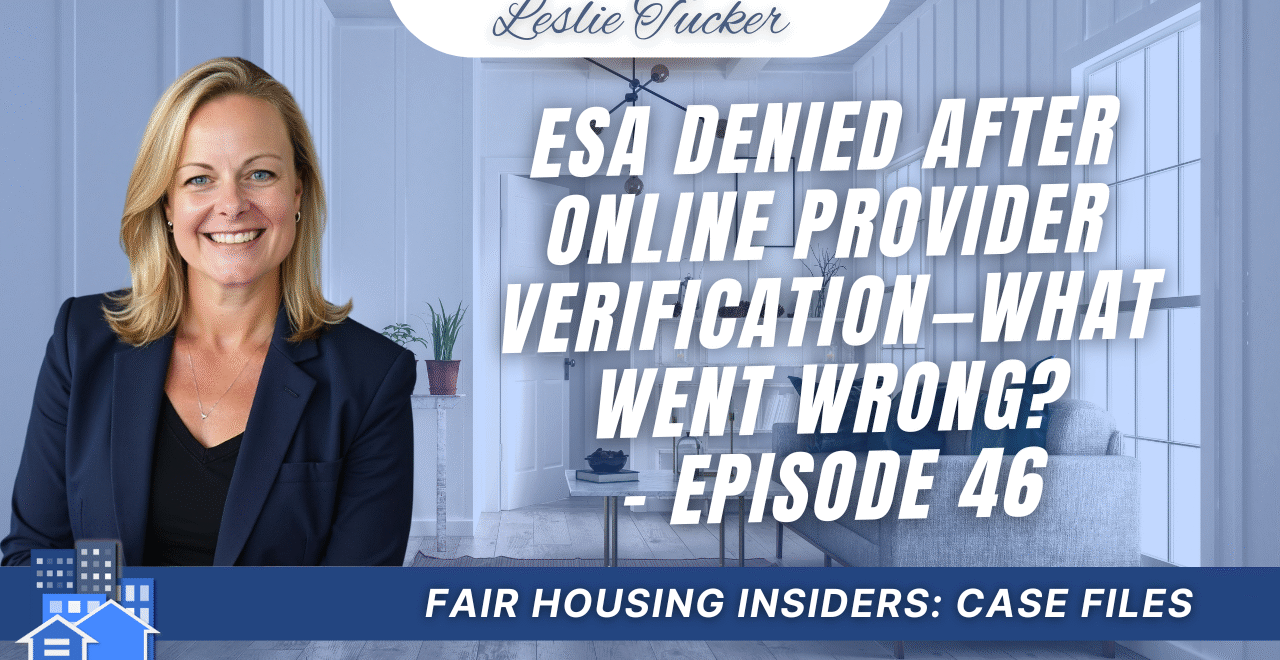Emotional support animals (ESAs) continue to be one of the most challenging and frequently misunderstood topics in property management. The case of United States v. Greenbrier Partners LLC highlights how missteps in handling an ESA request can create serious fair housing risks while also reminding housing providers of the very real impact their decisions have on residents’ well-being.
The Resident’s Request for an ESA
The case involves a graduate student who relocated to Florida for school. Like many students in transition, she faced the stress of a new environment without her usual support network. Living with longstanding mental health conditions, including PTSD, anxiety, and depression, she determined that an emotional support animal could help stabilize her daily life.
Because her longtime therapist was not licensed in Florida, she turned to an online provider. Through this process, she connected with a licensed counselor who held Florida credentials and conducted a telehealth consultation. After reviewing her history and medical needs, the provider issued a letter verifying her need for an ESA.
The Housing Provider’s Response
Within two days of receiving the verification letter, the housing provider denied the request. The denial cited a broad list of concerns, including potential financial burden, employee safety, operational disruption, insurance issues, and health risks. The provider also warned that her lease could be terminated for allegedly falsifying her application by stating she did not have a pet—even though she had not yet obtained the dog and was only seeking approval.
Are Telehealth ESA Letters Legitimate?
A major question raised in this case is whether verifications obtained through online providers or telehealth are valid. Under the Fair Housing Act, neither HUD nor federal guidance requires a verifier to be licensed in the same state where the resident lives. (Some state laws do include this requirement.) What matters is whether the professional has personal knowledge of the individual’s disability and need for an assistance animal.
While HUD has discouraged reliance on quick online questionnaires or one-time phone calls with little personal connection, telehealth providers can still be legitimate verifiers. If a housing provider questions the reliability of verification, the best practice is to request additional documentation or clarification—not to immediately deny the request.
Can Financial Burden or Safety Risks Justify Denial?
Unlike other types of reasonable accommodations or modifications, ESA requests are rarely subject to denial on the grounds of financial or operational burden. Unless there is specific evidence of a particular animal posing a direct threat or creating damage, housing providers generally cannot use speculative concerns about cost, safety, or liability as grounds for refusal.
Key Lessons for Housing Providers
This case, though unresolved, offers important reminders for property management professionals:
Housing providers must carefully evaluate ESA requests and avoid automatic denials based on generalized concerns. Telehealth providers may be legitimate sources of verification, and when in doubt, it is a best practice to request clarification or additional documentation rather than issuing a denial. Above all, decisions should balance compliance with fair housing law and sensitivity to a resident’s needs.
You Might Also Like:
- Update on the Accessible Parking Case You’ve Been Following – Episode 49
- When Eviction Becomes Retaliation – Episode 48
- Case Files: The Price of Parking Discrimination – Episode 47
- Case Files: ESA Denied After Online Provider Verification—What Went Wrong? – Episode 46
- Case Files: When Mold, Disability, and Retaliation Collide – Episode 45

